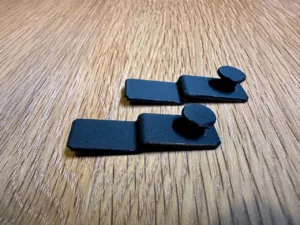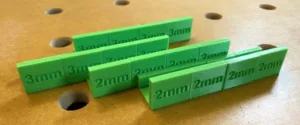There are a lot of large, sharp, and powerful tools in any given wood shop. These tools can maim and possibly kill someone. The idea of not having any type of safety equipment or first aid equipment is ridiculous, even if your shop is only a small corner of the garage. It’s arguably more important to have this equipment available when you’re new to the hobby.
Don’t take my word for it though, look at Stumpy Nubs, a popular woodworking channel on YouTube who’s been in the game for a very long time. Last year he had a major accident that affected his life in a massive way. He’s always been a careful and thoughtful woodworker who doesn’t cut corners and this still happened to him.
More recently Jonathan Katz-Moses had a pretty big accident on his jointer. He is also known to be careful around these types of machines. Not to harp on the point too much, but John Malecki also mashed his thumb last year while doing some home improvements.
What I’m trying to say is that it can happen to anyone. The best you can do is be prepared in case it happens to you.
Ok, great. But what safety equipment do you need in your shop? Great question, let’s go down the list of safety supplies and protective equipment you should have as a bare minimum with maybe a few extras at the end.
Fire Extinguisher
Hopefully, this one is pretty obvious. We’re dealing with wood and at times an awful lot of it. A lot of damage could be done with so much flammable material around and no way to stop it from burning. Couple that with a cupboard full of finishes, some of which may be flammable and you start to see the picture. This is dangerous for a shop, even more so considering most woodworkers tend to have shops attached or very close to their homes.
Make sure you properly dispose of used flammable finishes and chemicals; throwing them on top of a pile of wood chips and discarded shop towels isn’t it? When you get an extinguisher, make sure it can handle normal fires and chemical fires, or get two.
Safety Glasses
Not to discount the visually impaired woodworkers out there (of which I imagine there are more than I think), our eyes are probably the most important tool we have. For less than $5 you can get a basic pair of safety glasses from Home Depot. In all likelihood you’re probably making a bunch of trips there anyway so do yourself a favor and grab a few extras.

If you want to get fancy you could spend a little more money and get a pair of fashionable safety glasses.
Gloves
Some might not think it, but woodworking involves a decent amount of chemicals. For this reason, it’s smart to have a variety of gloves around and within reach. My shop usually has a mix of nitrile gloves and some heavier-duty ones.
Nitrile gloves are great to wear when you’re dealing with finishes and epoxy. You usually don’t want to get that stuff on your bare skin. I’ll put them on when doing finer work with CA glue too, mostly because I don’t like the feeling of it when it dries on my fingers (and it’s hard to remove).
Heavy-duty gloves are there to help prevent splinters when handling rough-sawn wood. They can also protect your hands when you’re handling sharp blades, like when you change out a bandsaw blade. I’ve found them useful for moving around full sheets of plywood as well. No point letting the corners and edges bearing the full weight of a 4×8 piece of plywood dig into my fingers unprotected.
Hearing Protection
If you’re getting into this hobby (or want to do it professionally someday), you’ve likely watched a lot of videos on the subject. During that time you’ve probably heard more than a couple of people promoting ear protection and offering up coupon codes. This is one of the times when advertising or sponsorship is a perfect union.
Hearing protection is very important when you’re using loud tools. Doesn’t matter if you’re only using it for a few minutes or a few hours, you should do your absolute best to protect your hearing somehow. Over the ear, in-ear doesn’t matter. If you don’t, at some point you’ll start damaging your hearing. Sure, there are ways to augment it, but why lead yourself down a path where that’s the option you’re settling on?

Get a bluetooth capable set, turn on some music or a podcast, and get in the groove. I’ve used Apple AirPods Pro and ISOtunes Pro 2 with great success. I’d like to try the over-ear ISOtunes soon, they’re a lot easier to take on and off quickly.
Respirators and Masks
We’ve talked about eyes and hearing, we should talk about lungs too. If you’re not breathing (or breathing well) you won’t be spending much time in the shop. Dust particles are tiny and they are all over the place. If you’re cutting, sanding, or finishing wood you should be wearing some type of mask to filter out those tiny particles.
Inhaling too much dust can cause tremendous damage to your lungs over time. Often it doesn’t look like much dust is being created while you’re working. But if you leave the shop for a couple of days and come back, it’s not hard to see the layers starting to build up on every surface. RZ masks are pretty popular and affordable. They have removable filters and filter packs are fairly priced as well.
If you want to get serious about controlling the dust in your shop you could step up your mask game and get a proper respirator. Other equipment such as fans with filters, air purifiers, and exhaust systems can be added as well. They can be quite expensive though.
Push Blocks
Ok, most of the important internal parts of your body are protected. The squishy bits that make life more comfortable to live are protected. Let’s talk about those meat hooks at the end of your arms. We’re working with loads of sharp edges on some fast-moving and powerful machines. Talk about a recipe for potential disaster.
If you have a table saw, bandsaw, jointer, router table, or even a miter saw, you need to get yourself some push sticks or push blocks. Some equipment comes with a couple of plastic push blocks; I think my jointer had a couple included. They aren’t the greatest but they are good enough to keep the material stable and my hands away from fast-spinning blades.
It feels like every woodworking channel on YouTube has at least one video on how to make a push block. They can be super simple to make out of plywood scraps or you can get complicated and fancy with expensive hardwoods, the choice is yours. Know that they will get chewed up by blades and are a disposable shop supply. Do what Next Level Carpentry does a good video on how to batch out a bunch of push blocks. Building Guru also has a good video on a beefy push stick I’ll make someday.
Clothing
Last but not least, let’s talk about woodshop shop clothes. Sure, I hear you when you say things like, “but DIY Builds wears sandals” or “so-and-so doesn’t wear this.” They are welcome to live their lives and wear what they want in their shops. I’m not the best role model for absolute shop safety 100% of the time either. But, until I had experience working with my tools I did my best to not make it easier to lose control or get trapped.
If I had a loose long sleeve shirt on, I rolled up the sleeves. After I dropped a piece of wood on my foot I started wearing steel-toe shoes (they come in all kinds of comfortable and stylish variations these days). I took any rings, bracelets, and watches I was wearing off when using power tools. The same goes if I had anything dangly around my neck.
Last year I purchased an apron for the first time. Not only is it handy to have some tools on me at all times, but it’s also strong enough to protect me from any kickback more than a t-shirt will. Do you have to get an apron right now if you’re starting out? Probably not. Do I think my purchase was worth it? Yes.
Summary
That about covers basic shop safety equipment you should keep around. You don’t have to complicate things. Keep it simple; protect the squishy bits, stop breathing dust, and no loose clothes around power tools. Take time to learn how to use your tools properly and you shouldn’t have any issues.



